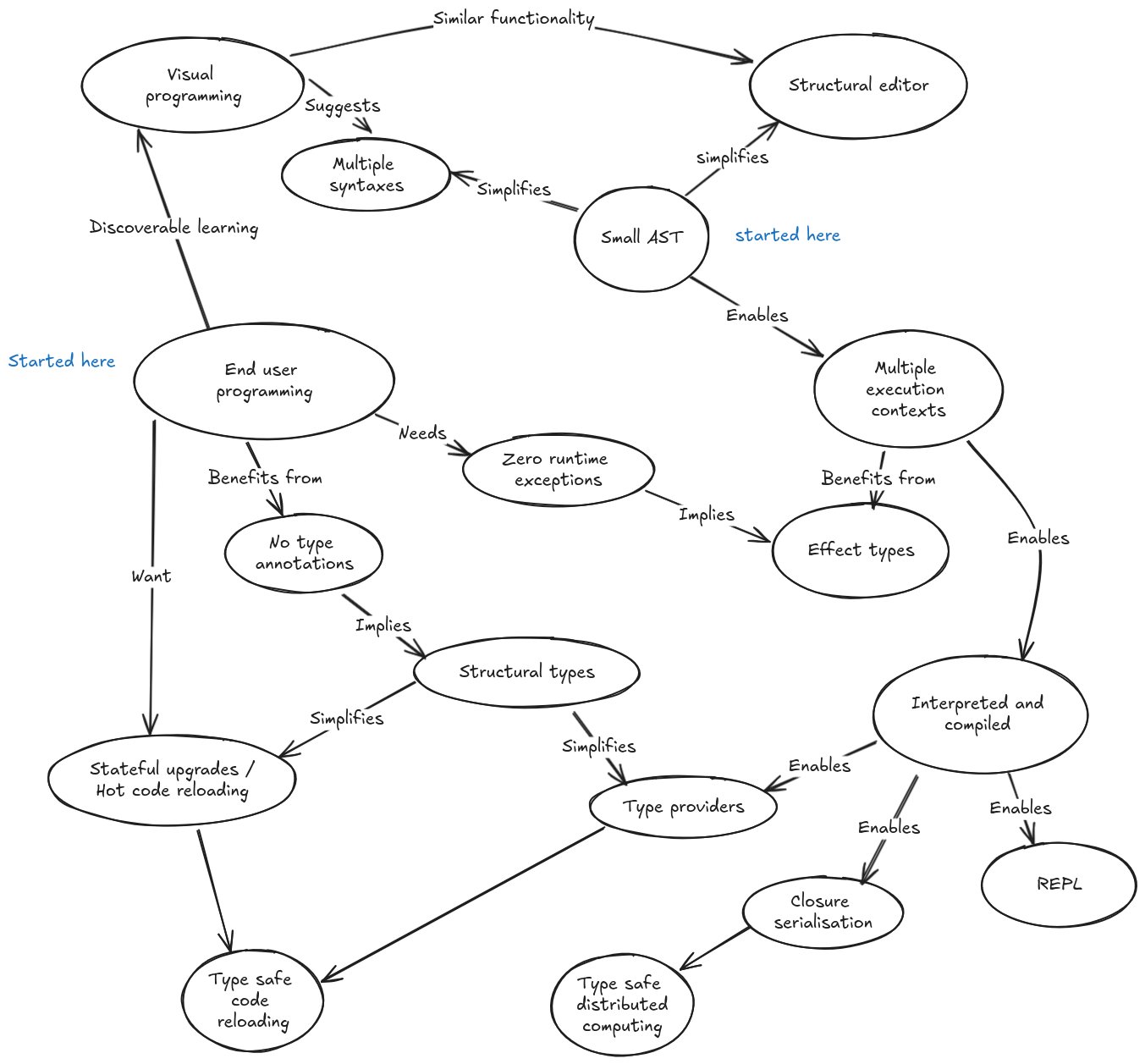class: middle <!-- # EYG a predictable and useful language --> <!-- Balancing predictable and useful in language design --> # Eat your **Greens** - <br/> A philosophy for language design. --- class: middle ## **Hi** ### *name -* Peter Saxton ### *@internets -* CrowdHailer ### *works -* Experimenting in building better languages and tools at [eyg.run](https://eyg.run) <img style="display:inline;width:100px;" src="https://avatars.githubusercontent.com/u/1481354?s=200&v=4" alt="Penelopea, EYG's mascot" class="w-full max-w-xl"> <img style="display:inline;width:100px;" src="https://gleam.run/images/lucy/lucy.svg" alt="Penelopea, EYG's mascot" class="w-full max-w-xl"> <img style="display:inline;width:100px;" src="https://eyg.run/assets/pea.8C463682609CAA4A5A638D66BAA7C5F8115EB83B6ED1D7FA3DE7ABC8F2CAB5AA.webp" alt="Penelopea, EYG's mascot" class="w-full max-w-xl"> --- class: middle 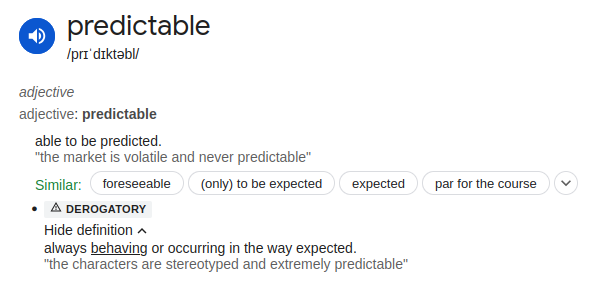 ??? Look at the derogatory version. JavaScript Wat --- class: middle 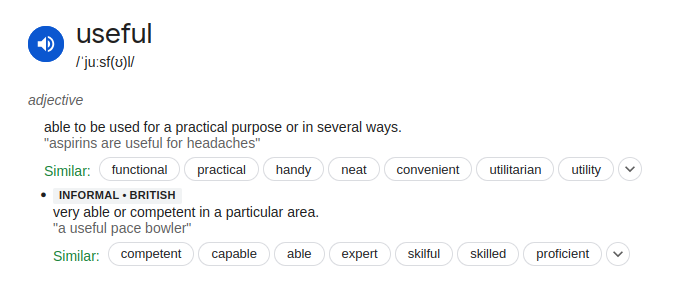 ??? Look at the first simile. --- class: middle **Predictable**: - No undefined behaviour. - Never crash. - Same answer every time. **Useful**: - Build the required applications. - Be useful in several ways, *but which ones?* --- class: middle ## Scale matters  ??? Why I got started - End user programming - Own your own software --- class: middle ## Rating language **features** Existing languages have already had to make choices that affect predictability and usability. --- class: middle 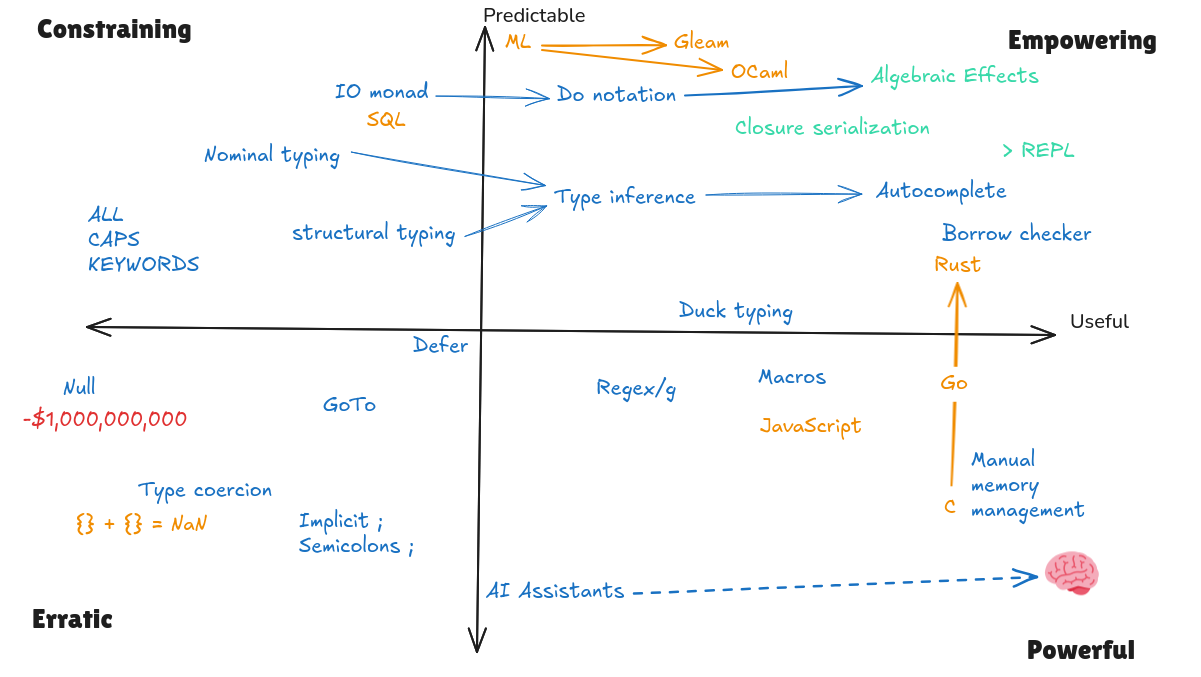 ??? Everything is deterministic and Turing complete. Rust has Zero Cost abstractions. structural typing applies to slightly more things i.e databases --- class: middle ## Find a **philosophy**  --- class: middle ## Eat Your **Greens** > Beyond diet, "eat your greens" can symbolize doing things that are good for you, even if they're not immediately enjoyable or easy. --- class: middle ## Who likes **types**? - Static? - Strong? - Gradual? -- Did you apprecate them the first day you were coding? --- class: middle ## Type systems are a **vegetable** ```py print("Hello, World!") ``` What do types add to this Python program? --- class: middle ## Types make things **harder** - Structured IO - JSON deserialization - SQL interop - Object creation - Foreign function interfaces -- Types are great for compounding value over time. --- class: middle  --- class: middle ## Gall's Law > A complex system that works is invariably found to have evolved from a simple system that worked. A complex system designed from scratch never works and cannot be patched up to make it work. You have to start over with a working simple system *The Systems Bible: The Beginner's Guide to Systems Large and Small* --- class: middle  --- class: middle 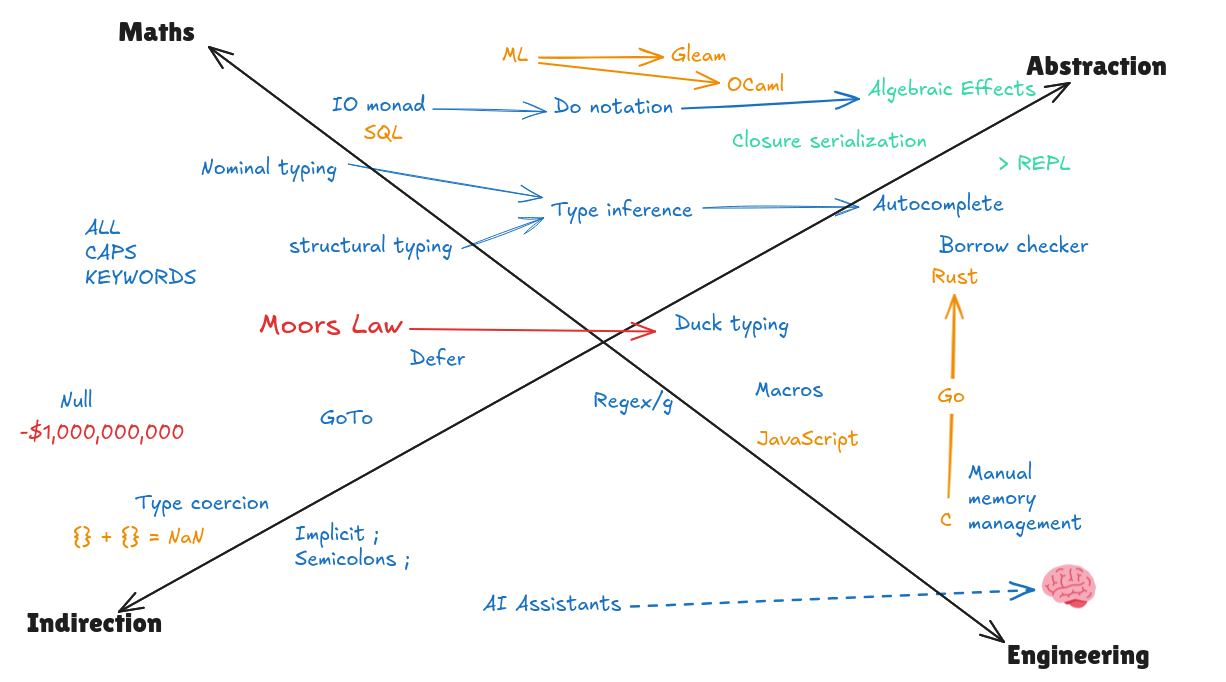 ??? WASM --- class: middle ## EYG the **Basics** - Statically typed - Structurally typed - Sound type inference - Algebraic effects - Closure serialization - Strongly typed REPL - Inline references (for another time) - Minimal AST (for another time) *I'll be talking about the other two later in the year.* --- class: middle ### EYG is **statically** typed <script type="application/json+eyg">{"0":"l","l":"$","v":{"0":"@","p":"std","r":2},"t":{"0":"l","l":"integer","v":{"0":"a","f":{"0":"g","l":"integer"},"a":{"0":"v","l":"$"}},"t":{"0":"l","l":"total","v":{"0":"a","f":{"0":"a","f":{"0":"a","f":{"0":"g","l":"add"},"a":{"0":"v","l":"integer"}},"a":{"0":"i","v":10}},"a":{"0":"s","v":"hello"}},"t":{"0":"v","l":"sum"}}}}</script> ??? embed code and see the type --- class: middle ### EYG is **structurally** typed <script type="application/json+eyg">{"0":"l","l":"alice","v":{"0":"a","f":{"0":"a","f":{"0":"e","l":"name"},"a":{"0":"s","v":"Alice"}},"a":{"0":"a","f":{"0":"a","f":{"0":"e","l":"age"},"a":{"0":"i","v":81}},"a":{"0":"u"}}},"t":{"0":"l","l":"bob","v":{"0":"a","f":{"0":"a","f":{"0":"e","l":"name"},"a":{"0":"s","v":"Bob"}},"a":{"0":"u"}},"t":{"0":"l","l":"greet","v":{"0":"f","l":"$","b":{"0":"l","l":"name","v":{"0":"a","f":{"0":"g","l":"name"},"a":{"0":"v","l":"$"}},"t":{"0":"l","l":"message","v":{"0":"a","f":{"0":"a","f":{"0":"a","f":{"0":"g","l":"append"},"a":{"0":"a","f":{"0":"g","l":"string"},"a":{"0":"@","p":"std","r":2}}},"a":{"0":"s","v":"Hello "}},"a":{"0":"v","l":"name"}},"t":{"0":"a","f":{"0":"p","l":"Alert"},"a":{"0":"v","l":"message"}}}}},"t":{"0":"a","f":{"0":"v","l":"greet"},"a":{"0":"v","l":"bob"}}}}}</script> --- class: middle ### EYG is **soundly** typed <script type="application/json+eyg">{"0":"l","l":"$","v":{"0":"@","p":"std","r":2},"t":{"0":"l","l":"integer","v":{"0":"a","f":{"0":"g","l":"integer"},"a":{"0":"v","l":"$"}},"t":{"0":"a","f":{"0":"a","f":{"0":"a","f":{"0":"m","l":"Lt"},"a":{"0":"f","l":"_","b":{"0":"s","v":"less"}}},"a":{"0":"a","f":{"0":"a","f":{"0":"m","l":"Eq"},"a":{"0":"f","l":"_","b":{"0":"s","v":"equal"}}},"a":{"0":"n"}}},"a":{"0":"a","f":{"0":"a","f":{"0":"a","f":{"0":"g","l":"compare"},"a":{"0":"v","l":"integer"}},"a":{"0":"i","v":10}},"a":{"0":"i","v":5}}}}}</script> This extends to effects. --- class: middle EYG is a **browser native** runtime. <script type="application/json+eyg">{"0":"l","l":"message","v":{"0":"s","v":"I've just finished the EYG introduction"},"t":{"0":"a","f":{"0":"a","f":{"0":"a","f":{"0":"m","l":"Ok"},"a":{"0":"f","l":"_","b":{"0":"s","v":"Tweeted successfully"}}},"a":{"0":"a","f":{"0":"a","f":{"0":"m","l":"Error"},"a":{"0":"f","l":"_","b":{"0":"s","v":"Failed to send tweet."}}},"a":{"0":"n"}}},"a":{"0":"a","f":{"0":"p","l":"Twitter.Tweet"},"a":{"0":"v","l":"message"}}}}</script> --- class: middle ## **Algebraic** effects An abstraction to represent all impure behaviour including: - Input and output operations - Non determinism i.e. random - Time - Exceptions - Concurrency - Mutability --- class: middle ### What is a **function**? > A function is the relation between a set of inputs and a set of outputs, so that every set of inputs has exactly one output.  --- class: middle Functions compose. 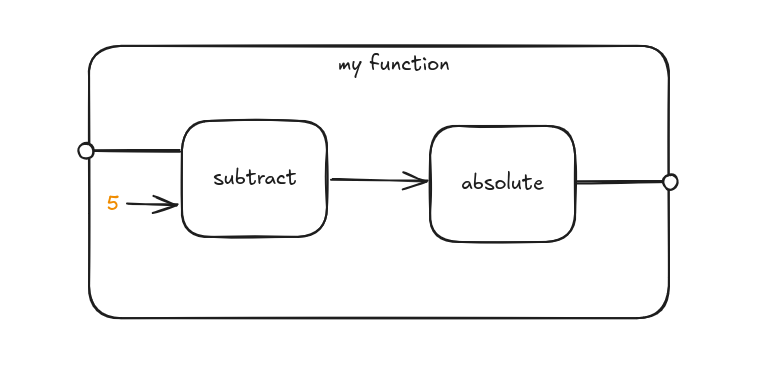 Functions can be values.  --- class: middle ### Side **effects** and side **causes** 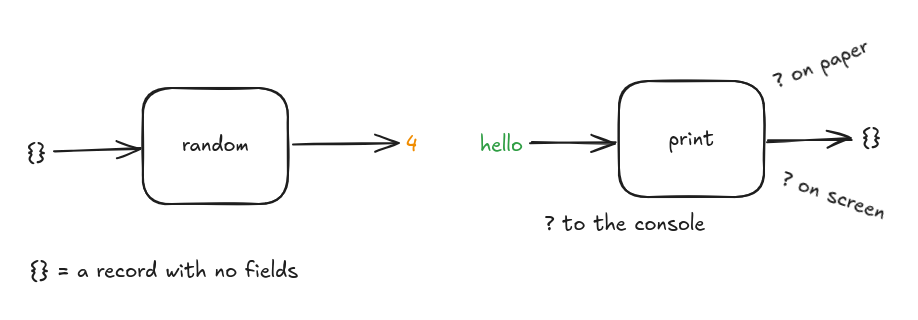 --  --- class: middle Side effects depend on the whole world. 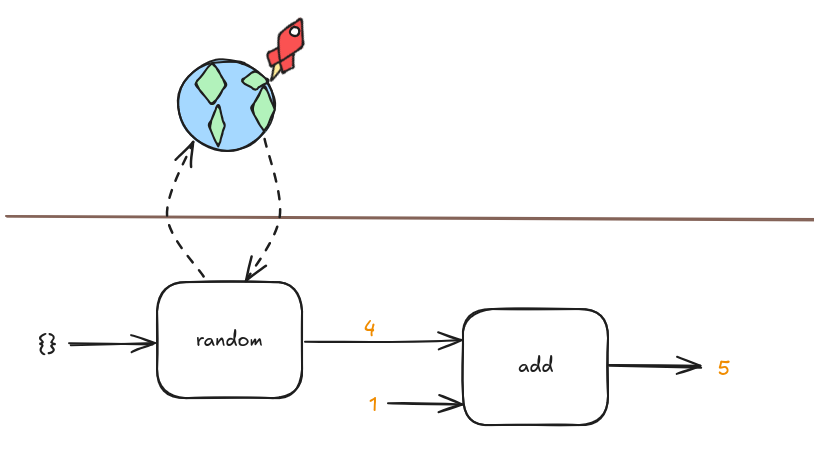 --- class: middle A quick aside for **continuations** 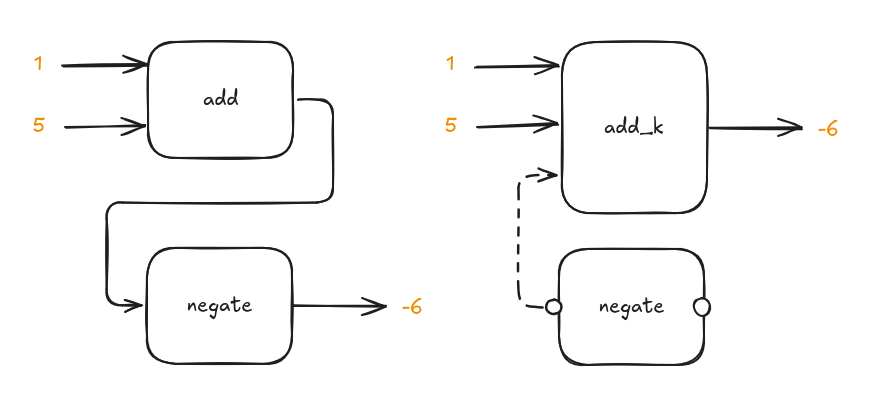 *The best resource explaining continuations is. [Delimited Continuations, Demystified by Alexis King](https://www.youtube.com/watch?v=TE48LsgVlIU)* --- class: middle Programs **perform** effects with the remaining program captured as a continuation. 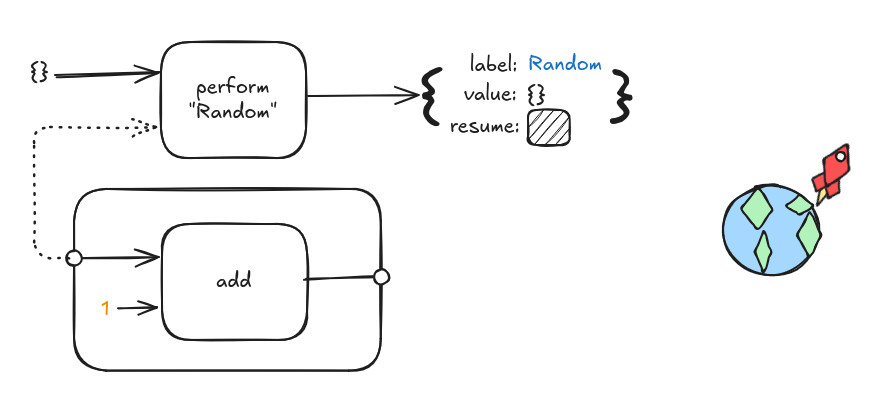 --- class: middle Runtimes **resume** programs by calling the stored continuation  --- class: middle Effects can be inferred <iframe style="width: 100%;height: 55vh;" src="https://eyg.run/editor"></iframe> --- class: middle <script type="application/json+eyg"> {"0":"l","l":"std","v":{"0":"@","p":"std","r":1},"t":{"0":"l","l":"capture","v":{"0":"f","l":"exec","b":{"0":"a","f":{"0":"a","f":{"0":"h","l":"Flip"},"a":{"0":"f","l":"value","b":{"0":"f","l":"resume","b":{"0":"l","l":"truthy","v":{"0":"a","f":{"0":"v","l":"resume"},"a":{"0":"a","f":{"0":"t","l":"True"},"a":{"0":"u"}}},"t":{"0":"l","l":"falsy","v":{"0":"a","f":{"0":"v","l":"resume"},"a":{"0":"a","f":{"0":"t","l":"False"},"a":{"0":"u"}}},"t":{"0":"a","f":{"0":"a","f":{"0":"g","l":"flatten"},"a":{"0":"a","f":{"0":"g","l":"list"},"a":{"0":"v","l":"std"}}},"a":{"0":"a","f":{"0":"a","f":{"0":"c"},"a":{"0":"v","l":"truthy"}},"a":{"0":"a","f":{"0":"a","f":{"0":"c"},"a":{"0":"v","l":"falsy"}},"a":{"0":"ta"}}}}}}}}},"a":{"0":"f","l":"_","b":{"0":"a","f":{"0":"a","f":{"0":"c"},"a":{"0":"a","f":{"0":"v","l":"exec"},"a":{"0":"u"}}},"a":{"0":"ta"}}}}},"t":{"0":"l","l":"run","v":{"0":"f","l":"_","b":{"0":"a","f":{"0":"a","f":{"0":"e","l":"second"},"a":{"0":"a","f":{"0":"p","l":"Flip"},"a":{"0":"u"}}},"a":{"0":"a","f":{"0":"a","f":{"0":"e","l":"first"},"a":{"0":"a","f":{"0":"p","l":"Flip"},"a":{"0":"u"}}},"a":{"0":"u"}}}},"t":{"0":"a","f":{"0":"v","l":"capture"},"a":{"0":"v","l":"run"}}}}} </script> --- class: middle ## **Closure serialization** > The process of converting a closure into a format that can be stored or transmitted. A closure is a function along with its captured environment. --- class: middle <script type="application/json+eyg">{"0":"l","l":"bump","v":{"0":"i","v":10},"t":{"0":"l","l":"message","v":{"0":"s","v":"hi"},"t":{"0":"l","l":"f","v":{"0":"f","l":"x","b":{"0":"a","f":{"0":"a","f":{"0":"b","l":"int_add"},"a":{"0":"v","l":"x"}},"a":{"0":"v","l":"bump"}}},"t":{"0":"a","f":{"0":"b","l":"capture"},"a":{"0":"v","l":"f"}}}}}</script> Serialized code can be handled, i.e. copy pasted. <br> <script type="application/json+eyg">{"0":"z","c":""}</script> --- class: middle Serialized code can be transpiled <script type="application/json+eyg">{"0":"l","l":"bump","v":{"0":"i","v":10},"t":{"0":"l","l":"message","v":{"0":"s","v":"hi"},"t":{"0":"l","l":"f","v":{"0":"f","l":"x","b":{"0":"a","f":{"0":"a","f":{"0":"b","l":"int_add"},"a":{"0":"v","l":"x"}},"a":{"0":"v","l":"bump"}}},"t":{"0":"a","f":{"0":"b","l":"capture"},"a":{"0":"v","l":"f"}}}}}</script> --- class: middle Is closure serialization possible in other languages? - short answer: yes - long answer: ermmmmmmmmmmmmmmmmmmmm... --- class: middle 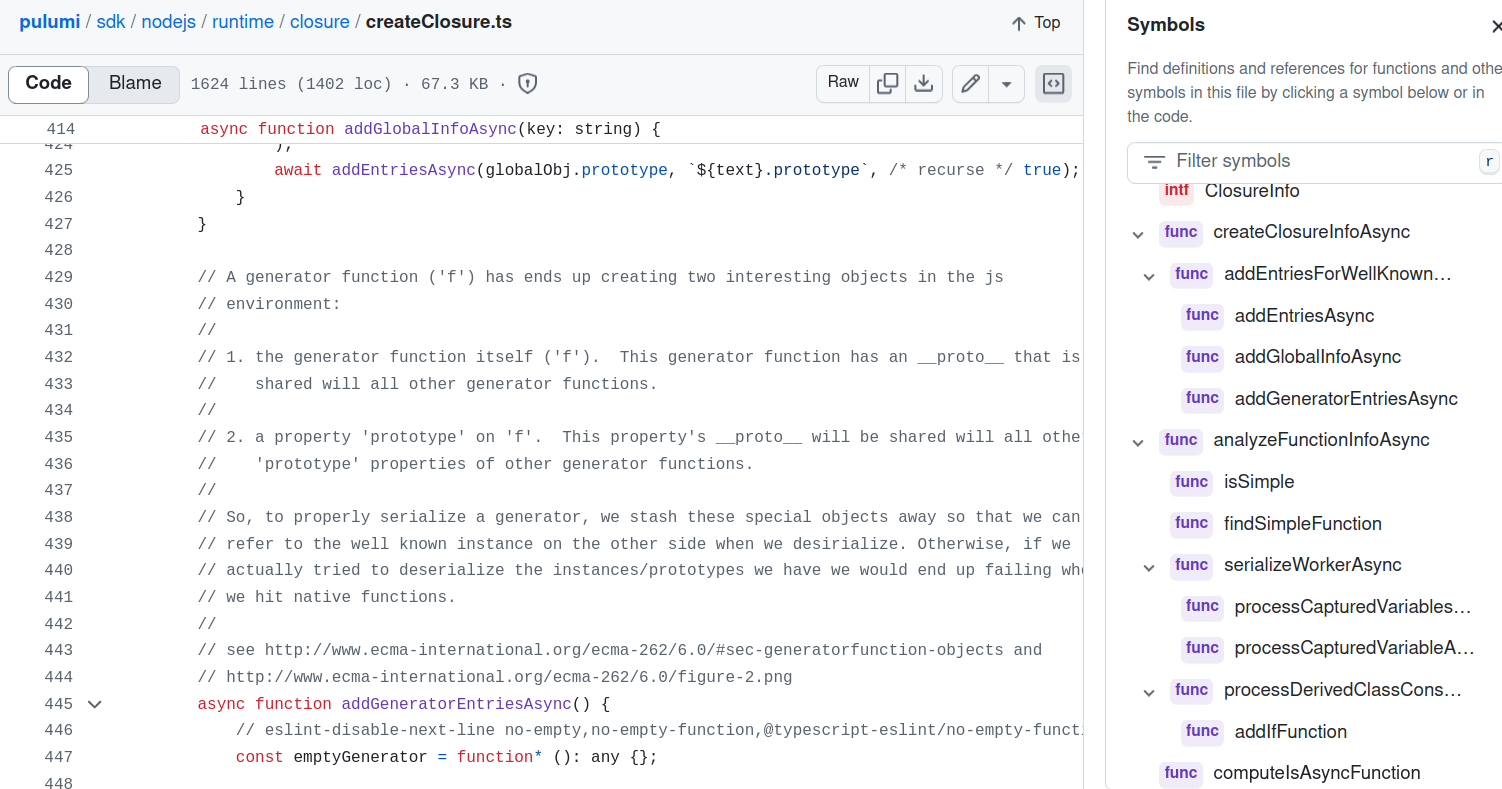 --- class: middle ### Why do closure serialization 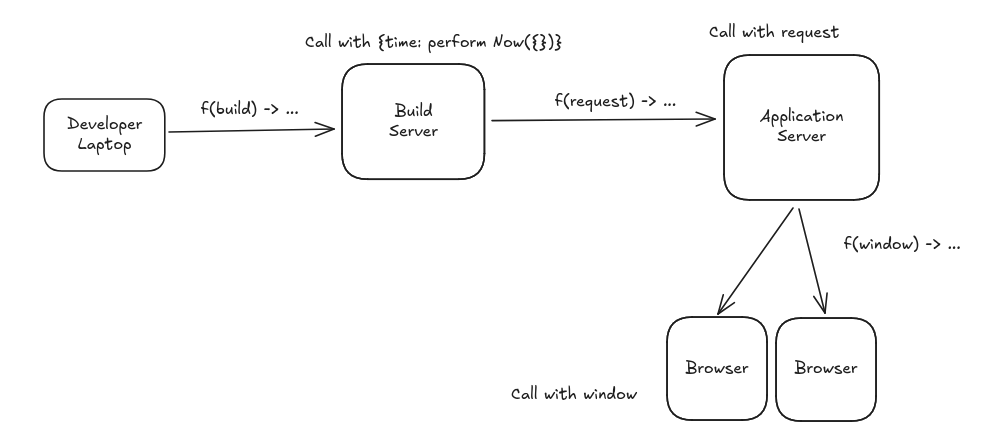 <script type="application/json+eyg">{"0":"l","l":"system","v":{"0":"f","l":"config","b":{"0":"f","l":"request","b":{"0":"f","l":"client","b":{"0":"a","f":{"0":"p","l":"Alert"},"a":{"0":"s","v":"hi"}}}}},"t":{"0":"v","l":"system"}}</script> ??? We already do but the packages are really inefficient Kill build scripts Sending types through time and space --- class: middle <script type="application/json+eyg">{"0":"l","l":"$","v":{"0":"@","p":"crowdhailer","r":2},"t":{"0":"l","l":"html","v":{"0":"a","f":{"0":"g","l":"html"},"a":{"0":"v","l":"$"}},"t":{"0":"l","l":"build","v":{"0":"f","l":"app","b":{"0":"l","l":"client","v":{"0":"a","f":{"0":"v","l":"app"},"a":{"0":"a","f":{"0":"a","f":{"0":"e","l":"created_at"},"a":{"0":"a","f":{"0":"p","l":"Now"},"a":{"0":"u"}}},"a":{"0":"u"}}},"t":{"0":"l","l":"app","v":{"0":"a","f":{"0":"a","f":{"0":"g","l":"script"},"a":{"0":"v","l":"html"}},"a":{"0":"a","f":{"0":"a","f":{"0":"b","l":"to_javascript"},"a":{"0":"v","l":"client"}},"a":{"0":"u"}}},"t":{"0":"l","l":"page","v":{"0":"a","f":{"0":"b","l":"string_to_binary"},"a":{"0":"v","l":"app"}},"t":{"0":"a","f":{"0":"a","f":{"0":"e","l":"name"},"a":{"0":"s","v":"index.html"}},"a":{"0":"a","f":{"0":"a","f":{"0":"e","l":"content"},"a":{"0":"v","l":"page"}},"a":{"0":"u"}}}}}}},"t":{"0":"l","l":"my_app","v":{"0":"f","l":"$","b":{"0":"l","l":"time","v":{"0":"a","f":{"0":"g","l":"created_at"},"a":{"0":"v","l":"$"}},"t":{"0":"f","l":"_dom","b":{"0":"l","l":"message","v":{"0":"a","f":{"0":"a","f":{"0":"b","l":"string_append"},"a":{"0":"s","v":"I was created at "}},"a":{"0":"v","l":"time"}},"t":{"0":"l","l":"_","v":{"0":"a","f":{"0":"p","l":"Alert"},"a":{"0":"v","l":"message"}},"t":{"0":"u"}}}}}},"t":{"0":"a","f":{"0":"p","l":"Download"},"a":{"0":"a","f":{"0":"v","l":"build"},"a":{"0":"v","l":"my_app"}}}}}}}</script> --- class: middle <script type="application/json+eyg">{"0":"l","l":"$","v":{"0":"@","p":"crowdhailer","r":2},"t":{"0":"l","l":"html","v":{"0":"a","f":{"0":"g","l":"html"},"a":{"0":"v","l":"$"}},"t":{"0":"l","l":"build","v":{"0":"f","l":"app","b":{"0":"l","l":"client","v":{"0":"a","f":{"0":"v","l":"app"},"a":{"0":"a","f":{"0":"a","f":{"0":"e","l":"created_at"},"a":{"0":"a","f":{"0":"p","l":"Now"},"a":{"0":"u"}}},"a":{"0":"u"}}},"t":{"0":"l","l":"app","v":{"0":"a","f":{"0":"a","f":{"0":"g","l":"script"},"a":{"0":"v","l":"html"}},"a":{"0":"a","f":{"0":"a","f":{"0":"b","l":"to_javascript"},"a":{"0":"v","l":"client"}},"a":{"0":"u"}}},"t":{"0":"l","l":"page","v":{"0":"a","f":{"0":"b","l":"string_to_binary"},"a":{"0":"v","l":"app"}},"t":{"0":"a","f":{"0":"a","f":{"0":"e","l":"name"},"a":{"0":"s","v":"/index.html"}},"a":{"0":"a","f":{"0":"a","f":{"0":"e","l":"content"},"a":{"0":"v","l":"page"}},"a":{"0":"u"}}}}}}},"t":{"0":"l","l":"my_app","v":{"0":"f","l":"$","b":{"0":"l","l":"time","v":{"0":"a","f":{"0":"g","l":"created_at"},"a":{"0":"v","l":"$"}},"t":{"0":"f","l":"_dom","b":{"0":"l","l":"message","v":{"0":"a","f":{"0":"a","f":{"0":"b","l":"string_append"},"a":{"0":"s","v":"I was created at "}},"a":{"0":"v","l":"time"}},"t":{"0":"l","l":"_","v":{"0":"a","f":{"0":"p","l":"Alert"},"a":{"0":"v","l":"message"}},"t":{"0":"u"}}}}}},"t":{"0":"l","l":"files","v":{"0":"a","f":{"0":"a","f":{"0":"c"},"a":{"0":"a","f":{"0":"v","l":"build"},"a":{"0":"v","l":"my_app"}}},"a":{"0":"ta"}},"t":{"0":"l","l":"site","v":{"0":"s","v":"4b271125-3f12-40a9-b4bc-ccf5e82879dd"},"t":{"0":"a","f":{"0":"p","l":"Netlify.DeploySite"},"a":{"0":"a","f":{"0":"a","f":{"0":"e","l":"site"},"a":{"0":"v","l":"site"}},"a":{"0":"a","f":{"0":"a","f":{"0":"e","l":"files"},"a":{"0":"v","l":"files"}},"a":{"0":"u"}}}}}}}}}}</script> --- class: middle ### The **first** environment > A read-eval-print loop (REPL), also termed an interactive toplevel or language shell, is a simple interactive computer programming environment that takes single user inputs, executes them, and returns the result to the user --- class: middle ### Typing a **REPL** - Types are refined - The result of `eval` can be typed - Type checking is optional ??? {"0":"a","f":{"0":"b","l":"eval"},"a":{"0":"a","f":{"0":"a","f":{"0":"c"},"a":{"0":"a","f":{"0":"t","l":"Let"},"a":{"0":"s","v":"x"}}},"a":{"0":"a","f":{"0":"a","f":{"0":"c"},"a":{"0":"a","f":{"0":"t","l":"Integer"},"a":{"0":"i","v":100}}},"a":{"0":"a","f":{"0":"a","f":{"0":"c"},"a":{"0":"a","f":{"0":"t","l":"Variable"},"a":{"0":"s","v":"x"}}},"a":{"0":"ta"}}}}} --- class: middle <iframe style="width: 100%;height: 65vh;" src="https://eyg.run/editor"></iframe> --- class: middle ## **Structural** or **Nominal** typing? Java ```java class Person { public name: string; } ``` TypeScript ```ts interface Person { name: string; } ``` --- class: middle ## **Structural** or **Nominal** typing? - Structural types are universal - Nominal types have a bounded validity, *usually a single compilation.* - Nominal typing requires type declarations --- class: middle ## Eat your **Greens** A simple type system leveraged everywhere is more interesting than a complex one limited to the application. - Development environments - Build servers - CI/CD - codegen - Backend/frontend - Service workers - Background queues - Infra provisioning - Database queries A single typed program should extend over the whole stack --- class: middle # One more thing Code **reloading** .. if we have time. --- class: middle # Questions? - [eyg.run](https://eyg.run) - Join the mailing list --- class: middle There is more coming ... 